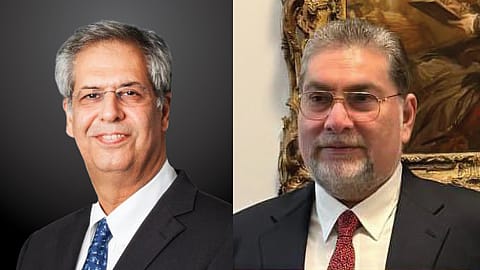Mehli Mistry’s goodbye puts full onus of Tata Trusts’ success on Noel Tata
With Mehli Mistry's departure, Noel Tata assumes full responsibility for Tata Trusts' future. The blocked reappointment of Mistry signals a power shift, consolidating Noel's leadership. Supported by key trustees, Noel is tasked with navigating the Trusts' strategic direction, ensuring stability and continuity in the post-Ratan Tata era.

In a significant turning point in Tata Trusts dispute, Mehli Mistry — a long-time confidant of Ratan Tata and key voice of dissent within Trusts — has opted to part ways after his reappointment as a permanent trustee was blocked by the team led by Trusts chairman Noel Tata. The move not only quelled internal opposition but also placed the complete responsibility for the Trusts’ future direction squarely on Noel Tata’s shoulders.
In a letter to Noel Tata, Mistry wrote with a mix of restraint, “My commitment to Ratan Tata’s vision includes a responsibility to ensure that the Tata Trusts are not plunged into controversy.” He ended with a subtle reminder, quoting Ratan Tata himself: “Nobody is bigger than the institution it serves.”
Mistry also wrote, “Precipitating matters would cause irreparable harm to the reputation of the Tata Trusts.”
Among the seven trustees of the two key boards — chairman Noel Tata, vice chairman Venu Srinivasan, and Vijay Singh — voted against Mistry’s renewal on the boards of the Sir Dorabji Tata Trust and the Sir Ratan Tata Trust. These two philanthropic powerhouses together hold about 66% of Tata Sons, the holding company of the Tata conglomerate. The remaining trustees — Pramit Jhaveri, Darius Khambata, and Jehangir HC Jehangir — were understood to have supported Mistry’s stance, opposing Noel Tata’s recent decisions.
With the majority against him, Mistry’s reappointment was effectively blocked, signalling a decisive shift in the balance of power within the Trusts. The outcome marks a clear consolidation of authority — dissent against Noel Tata has been neutralised, and control of the Trusts, along with significant influence over the Tata Group’s strategic direction, now firmly rests with him.
Once considered one of Ratan Tata’s most trusted lieutenants, Mehli Mistry had long been an influential insider in the Trusts’ functioning. However, friction reportedly grew after Mistry questioned certain decisions of Noel Tata — particularly regarding the continuation of Vijay Singh on the Tata Sons board. Singh was later voted out as a Tata Sons director, further deepening divisions among the trustees.
As the situation escalated, the government stepped in. Home Minister Amit Shah and Finance Minister Nirmala Sitharaman met with Noel Tata, Tata Sons chairman N Chandrasekaran, and Darius Khambata, advising them to resolve the dispute internally to prevent any negative impact on investor confidence.
Recommended Stories
The consolidation of power under Noel Tata brings both stability and heightened expectations. His leadership will be tested in managing the delicate intersection of philanthropy, governance, and corporate control in the post-Ratan Tata era.
By securing the backing of Venu Srinivasan and Vijay Singh, Noel has forged a core alliance capable of guiding the Trusts with greater unity.
For now, Mehli Mistry’s departure sends a clear message that the dissent is an old story. The task of safeguarding Tata legacy now lies entirely with Noel Tata.